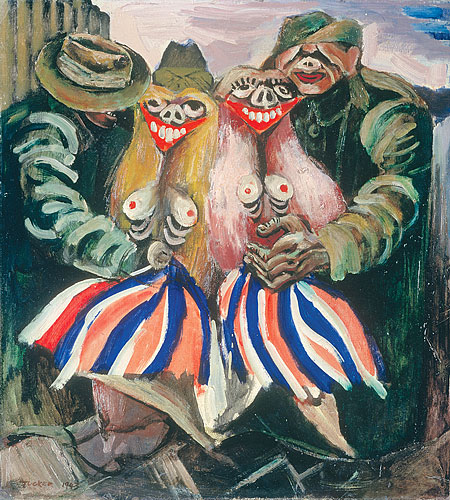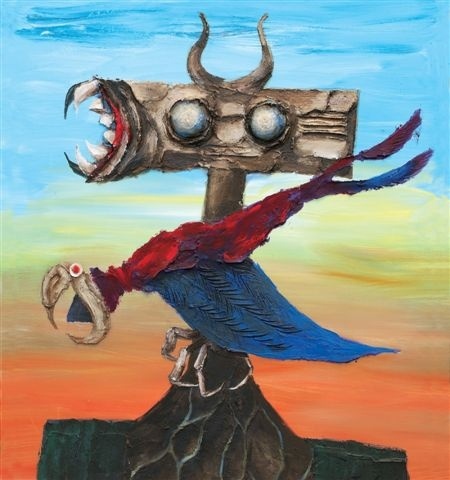Australia. 1944. Were their poems worthless, masterpieces or elaborate put-ons? Almost seventy years after their composition, no one is really that sure. For it is part of a celebrated hoax that fooled the critics and set modern poetics askew. “Deliberately perpetrated bad verse.” The goal, the authors said, was to show that modern critics had become “insensible of absurdity,” but the critics countered by insisting that they had accidentally created a masterpiece. How Ern Malley got the last laugh…
(see link at end): The Angry Penguins trial concluded a script which nobody without a sense of humour could have invented, and nobody with one could resist. If the Ern Malley poems were surreal, so was the situation. The trial confirmed all over again that the hoax had demolished its literary boundaries, and invaded the world. It made Ern Malley even more famous and legitimized the shrieks of approval that greeted the hoax. McAuley and Stewart had not for a second intended to trick Harris into the courts. They failed to realize that Ern Malley would hand out guns to philistines — and now the state was providing the bullets. The trial was a shambles, with none of the rapier wit of the hoax. The police evidence was risible, the Crown prosecutor a lowbrow bulldog, and the defence counsel out of his depth….
The trial was the hottest show in town. Nothing like this had ever happened in Adelaide before. On the morning of 5 September, the courtroom on Victoria Square was ‘crowded as a picture theatre’, and buzzing with anticipation. The national press was in attendance, and the trial was reported throughout the country. Many had come to watch the law in action as a form of spectator sport though not everybody there was friendly to Harris. He reported to Reed that there were ‘hordes of Catholics’ in the courtroom. Read More:http://jacketmagazine.com/17/ern-heyw.html
They felt, McAuley and Srewart insisted, no “personal malice” toward Max Harris. They had, however, “observed with distaste the gradual decay of meaning and craftsmanship in poetry,” making readers increasingly “insensible of absurdity and incapable of ordinary discrimination.” Consequently, they had decided to carry out a “serious literary experiment” to find out whether proponents of modernism- of whom the Angry Penguins were the most conspicuus on the Australian scene- would recognize ” deliberately concocted nonsense” when they saw it. In a single free afternoon at Victoria Barracks in Sydney, they had produced the entire lifework of the tragic Ern, and at odd moments in the ensuing days worked out the details of his life.
How the poems were composed made a curious tale in itself. The co-authors had,they said, made use of various books, including the Concise Oxford English Dictionary, a collection of Shakespeare’s plays, and a dictionary of quotations.
We opened books at random, choosing a word or phrase haphazardly. We made lists of these and wove them into nonsensical sentences. We misquoted and made false allusions. We deliberately perpetrated bad verse, and selected awkward rhymes from Ripman’s Rhyming Dictionary. The alleged quotation from Lenin in one of the poems, ‘The emotions are not skilled workers’ is quite phoney. The first three lines of the poem ‘Culture as Exhibit’ were lifted, as a quotation, straight from an American report on the drainage of breeding-grounds of mosquitoes….

—FOR nearly 50 years, it sat among a pile of painter’s panels and boards, forgotten and gathering dust. Today, Albert Tucker’s 1954 masterwork Flirtation makes its Australian debut.
This colourful and bold expressionist painting has never been photographed, and apart from a London exhibition in 1957, has never been seen by the public.
Nor has it been offered for sale – until now. In a cut-throat year for the art auction world, Tucker’s widow, Barbara, has agreed to sell Flirtation at Bonhams & Goodman’s Melbourne auction next month.—Read More:http://www.theaustralian.com.au/arts/feeding-the-art-world-some-tucker/story-e6frg8n6-1111113171790
Their principles also stipulated that there ‘be no coherent theme, at most, only confused and inconsistent hints of a meaning’, and that no care be taken ‘with verse technique, except occasionally to accentuate its general sloppiness by deliberate crudities’. Read More:http://www.lrb.co.uk/v15/n17/mark-ford/marvellous-boys
Australia’s newspapers, no less hostile than the hoaxers to surrealism, Dada, and other cultural currents from foreign shores, gleefully embarked on an orgy of derision. Next, American and British wire services picked up the story. Time Magazine delightfully termed the hoax “as fantastic as a duck-billed platypus,” and Newsweek declared that McAuley and Stewart proved that “a literary fashion can become so hypnotically powerful that it can suspend the operation of critical intelligence,” shaming doubters to silence “by the fear of appearing stupid ot, worse crime! reactionary.”
The press, having had its fun, then dropped the story. Then a new sensation occurred in the Ern Malley story: a police action against Angry Penguins magazine on the charge that seven of the poems constituted “indecent advertisements” and that certain other items in the same issue were either “indecent, immoral or obscene.” The trial ended in conviction: five pounds fine for Max Harris. Outside Australia, it went largely unreported, but the shock waves set in motion by the Ern Malley affair cont
d to shake the underpinnings in some quarters….( to be continued)ADDENDUM:
(see link at end)…While McAuley and Stewart thought Malley’s works devoid of merit, others believed then, and still believe today, that they possess genuine literary value. In his initial enthusiasm, Harris had sent a copy of the Malley issue of Penguins to Herbert Read, the great British critic, who, though he received it after the scandal broke, nevertheless was full of praise for the work. As Read put it in a letter to Harris, the hoaxer:
must inevitably use processes akin to, if not identical with, the original work of art. If his model is something conventional, the parody may be all the more difficult to make, for it is easy to detect. But if, as in the present case, the type of art parodied is itself unconventional and experimental, then the parodist has exceptional freedom, and because of his freedom, can end by deceiving himself. … It comes down to this: if a man of sensibility, in a mood of despair or hatred, or even from a perverted sense of humour, sets out to fake works of imagination, then if he is convincing, he must use the poetic facilities. If he uses the poetic facilities to good effect, he ends up deceiving himself. … This kind of [work] is modern Ossian, [and] like Ossian, can understandably deceive the best of critics.19
Ossian, the most famous and influential literary hoax of the eighteenth century, was purportedly a blind third-century warrior who wrote Fingal. “Discovered” and translated by the Scottish poet James Macpherson, the six-part epic poem became a rallying cry for Scottish nationalism. Even when “the piercing eye of Samuel Johnson” uncovered it as a hoax by Macpherson, the book had “an influence that no critic could kill. …Some of the greatest figures of the time (Goethe, Schiller, …even Napoleon) took him up, finding in Ossian the true rugged voice of primitive Europe, a Nordic Homer.”20 Read More:http://cabinetmagazine.org/issues/33/wertheim.php





 COMMENTS
COMMENTS